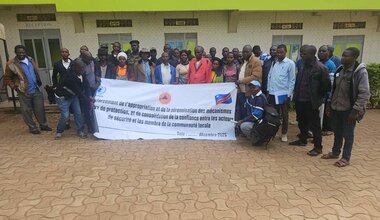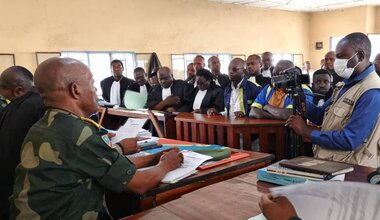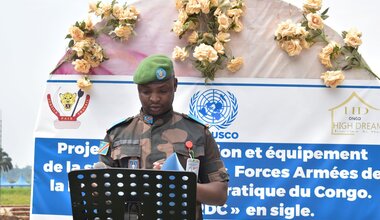International Day of the World’s Indigenous Peoples
Post 2015 Agenda: Ensuring indigenous peoples' health and well-being
Martin Kobler, Head of MONUSCO, calls for the effective promotion of the economic, social, cultural and political rights of indigenous peoples, on the occasion of the International Day of the World’s Indigenous Peoples
Kinshasa, 9 August 2015 – “The celebration of the International Day of the World’s Indigenous Peoples is a reminder of our common and shared responsibility to combat discrimination against the indigenous communities”, declared Martin Kobler, the Special Representative of the UN Secretary-General in the DRC, on the occasion of the International Day of the World’s Indigenous Peoples, celebrated on 9 August.
– “The celebration of the International Day of the World’s Indigenous Peoples is a reminder of our common and shared responsibility to combat discrimination against the indigenous communities”, declared Martin Kobler, the Special Representative of the UN Secretary-General in the DRC, on the occasion of the International Day of the World’s Indigenous Peoples, celebrated on 9 August.
Despite the paucity of information in this regard, an estimated 370 million indigenous peoples reside in some 90 countries worldwide. They represent a rich diversity of cultures, religions, traditions, languages; yet continue to be among the world's most marginalized population groups. In DRC, most indigenous pygmies live and depend on forest and are considered to be the first people or inhabitants of the DRC. Many of them have been forced to abandon their traditional life and culture because of expropriation of indigenous lands for conservation and logging. Furthermore, the health status of indigenous peoples varies significantly from that of non-indigenous population groups.
The Head of MONUSCO, Martin Kobler, further called for the promotion of peace between all communities, referring to the Pygmies-Luba conflict in Katanga: “I call on both Pygmies and the other communities to return to a life of peaceful cohabitation. Violence is not an option. All conflicts have to be resolved peacefully”.
Notes to editors:
The government estimates that there are around 600,000 Pygmies in the DRC (1% of the Congolese population). They are found in ten of the country’s eleven provinces and are divided into four main groups: the Bambuti (Mbuti), the Bacwa (Baka), the Batwa (Twa) of the West and the Batwa (Twa) of the East.
The United Nations Declaration on the Rights of Indigenous Peoples, adopted by the United Nations General Assembly in 2007, recognizes indigenous peoples’ right to self-determination and their right to freely pursue their economic, social and cultural development, and develop past, present and future manifestations of their culture in various forms. The International Day of the World’s Indigenous Peoples is commemorated annually on 9 August, in recognition of the first meeting of the United Nations Working Group on Indigenous Populations, held in Geneva in 1982.
This year's theme, Post 2015 Agenda: Ensuring indigenous peoples' health and well-being, puts a spotlight on the issue of indigenous peoples' access to health care services, as improving indigenous peoples’ health remains a critical challenge for indigenous peoples, Member States and the United Nations. The “State of the World’s Indigenous Peoples, Volume II”, launched at the UN Headquarters event in observance of the International Day, provides important background information on the topic.
 UN
UN United Nations Peacekeeping
United Nations Peacekeeping





